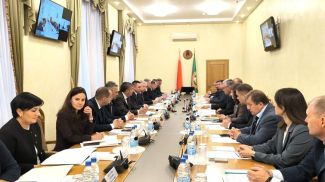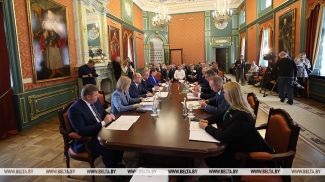MINSK, 12 July (BelTA) – A new edition of the law on customs regulation is being developed in Belarus. The process was discussed by representatives of the customs service and the business community at a session of the public advisory board under the State Customs Committee of Belarus on 12 July, BelTA has learned.
Chairman of the State Customs Committee of Belarus Yuri Senko said: “Active work is in progress to improve business operation terms in Belarus. The customs service is also taking measures to help develop international trade, including online trade, facilitate foreign trade aspects of business operations in order to enable the most favorable conditions for the development of the national economy. An action plan has been approved to bring the Belarusian legislation into compliance with the Customs Code of the Eurasian Economic Union (EAEU). We've set up a working group to prepare a new revision of the law on customs regulation. It will include nine chapters and about 360 articles. An expert group has been set up under the public advisory board to take a closer look at the bill. The group includes representatives of the customs service and the private sector. The expert group has already held two sessions. Remarks and proposals of the private sector on four chapters of the bill were discussed.”
Dmitry Kovalenok, Head of the Central Office for Customs Control Organization of the State Customs Committee of Belarus, said that work on the bill on customs regulation represented a logical continuation of the work on the Eurasian Economic Union Customs Code, which came into force on 1 January 2018. The EAEU Customs Code norms will be reflected in Belarusian laws. Close attention is paid to digital declarations, one-stop shop principle, authorized economic operators, and free economic zones. “We continue the dialogue with representatives of the private sector. In particular, we've come with compromises on temporary storage warehouses and peculiarities of customs declarations. There are a lot of new things ahead of us – periodical declaration, preliminary declaration, and incomplete declaration. New opportunities for Belarusian companies to reduce financial costs will be opened up,” he explained.
Gennady Danilenko, Head of the Central Office for Tariff Regulation and Customs Duties of the State Customs Committee of Belarus, added that tight cooperation had been established with tax authorities as part of the comprehensive revision of the Tax Code. “It is also part of the customs regulation sphere. Some clauses of the Tax Code are used by the customs service, too. Certain adjustments may be required,” he noted. “We would like to implement norms specified by the Entrepreneurship Development Ordinance: the penalty fee can be halved if it is paid voluntarily. We also suggest allowing paying customs duties to third parties. The collection of customs clearance fees will be adjusted as well.”
Gennady Danilenko added that approaches to postponing payments and allowing paying by installment are being systematized. Time frames, reasons, and conditions for providing deferment will be changed. The effective legislation allows deferment of up to two months. In the future the time may change to six months since the day the goods are released.
The bill also mandates sending digital information about the payment of customs duties to the customs body. Hardcopy documents may be sent only in rare cases.
In line with the bill measures to exact customs fees will not be taken if they have not been collected after five years since the time they were supposed to be paid.













